12 of the best referral marketing software tools for 2026
By Zach Links●12 min. read●Dec 15, 2025
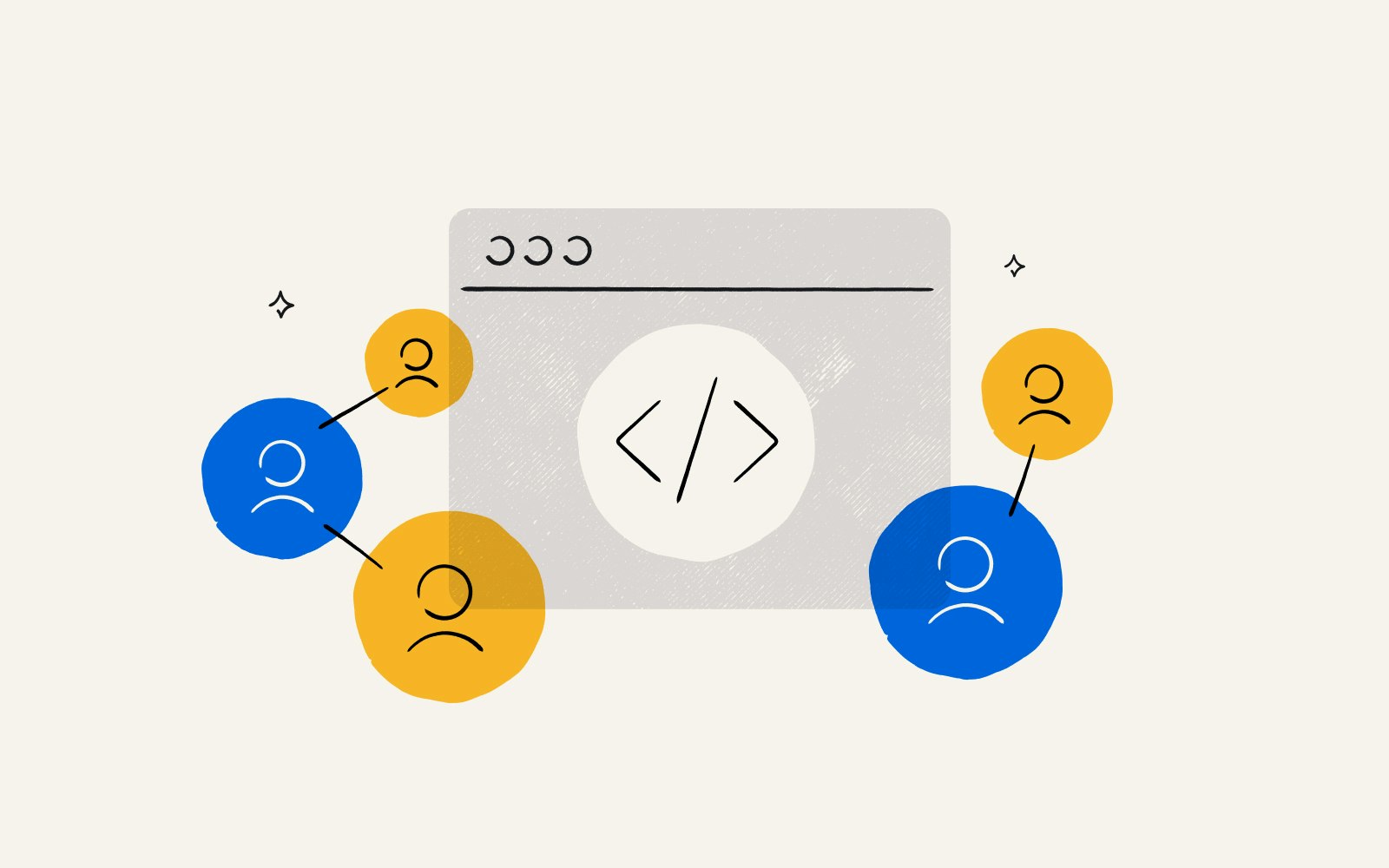
Referral marketing offers a low-cost, high-value avenue to grow your customer base. A well-designed program can help you both acquire and retain new customers because referred customers are more likely to stick around.
But without the right tools, marketing teams can struggle with the nuts and bolts of managing a referral program. Tracking and validating referrals, distributing rewards, measuring program performance — it all adds up.
That’s where referral marketing software comes in. A good referral program software service can do almost everything for you.
To guide which platform you should use, check out the pros and cons, integrations, and use cases for nine of the most popular referral marketing tools.
12 of the best referral marketing software tools of 2025
Choosing the right referral platform has a big impact on your program's success. These 10 top referral marketing software tools have the potential to automate and scale your referral marketing program, but which one to choose depends on your specific needs.
Friendbuy
Friendbuy powers referral and loyalty programs for global brands like Disney, Nestle, and Walmart. This referral marketing software comes with a powerful widget builder, an editor, and customization features.
You can use Friendbuy to create branded referral experiences and put them anywhere on your website or mobile app. If you need deeper customization, you’ve got APIs and event triggers at your fingertips.
Friendbuy also offers extensive A/B testing and tracking, which makes it easy to optimize your program based on what's working vs. not.
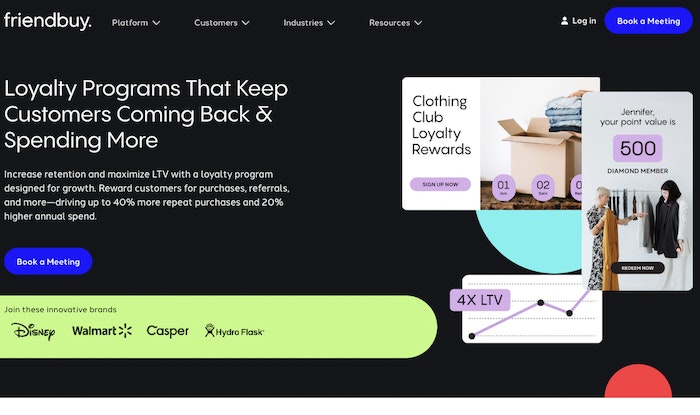
Pros
Highly customizable widgets with API access
Strong analytics and A/B testing tools
Scalable for enterprise-level referral programs
Easy to launch without heavy upfront dev work
Helpful and responsive user support
Cons
Pricing may be steep, especially for smaller businesses, and the company doesn’t publish a pricing page
Customization requires at least basic coding knowledge.
Heavy focus on points systems rather than rewards like gift cards or cashback
Limited ability to communicate with customers through the Friendbuy platform
Friendbuy integrations
Shopify
Klaviyo
Braze
ReCharge
Segment
Iterable, and more
See the full list of Friendbuy integrations.
Use Friendbuy if: You’re an enterprise e-commerce or direct-to-consumer (DTC) brand looking for referral software that’s scalable, fairly easy to implement, and comes with in-depth testing and tracking tools.
Lootly
Lootly helps growing B2B, B2C, and D2C businesses build loyalty and referral programs. The platform's mobile-first design gives customers a consistent experience across all device types. Plus, you get extensive customization options for reward campaigns, messaging, and program rules.
Beyond standard loyalty tools, Lootly offers multi-language support and localization capabilities for global brands. The Lootly Goal Referrals feature is a big hit: it lets companies gamify customer engagement. And who doesn’t love the challenge of playing (and beating) a game?

Pros
Offers points-based rewards, VIP tiers, and referral programs all in one place
Easy to customize rewards, including discounts, free products, or exclusive perks
User-friendly interface and setup
Real-time analytics to track engagement and ROI
Cons
Pricing can be high for smaller businesses, starting at $299 a month. That said, you get a seven-day free trial and a 60-day, money-back guarantee
Limited integrations with less-common e-commerce tools
Lootly integrations
Shopify
BigCommerce
Magento 2
WooCommerce
Klaviyo
Gorgias
PowerReviews
Recharge
Attentive
Tremendous, and more
See the full list of Lootly integrations.
Lootly also supports custom integrations via API.
Use Lootly if: You’re a small or mid-sized e-commerce brand that wants to combine loyalty, referrals, and affiliate marketing in one tool. Lootly is a great fit if you’re focused on retention, want flexible reward options, and use a supported e-commerce or marketing platform.
Talkable
Talkable is an enterprise referral marketing platform that powers refer-a-friend programs for major brands like American Eagle, L'Occitane, TOMS, and FitJoy. It also powers influencer marketing, post-purchase, and giveaway campaigns to drive revenue growth.
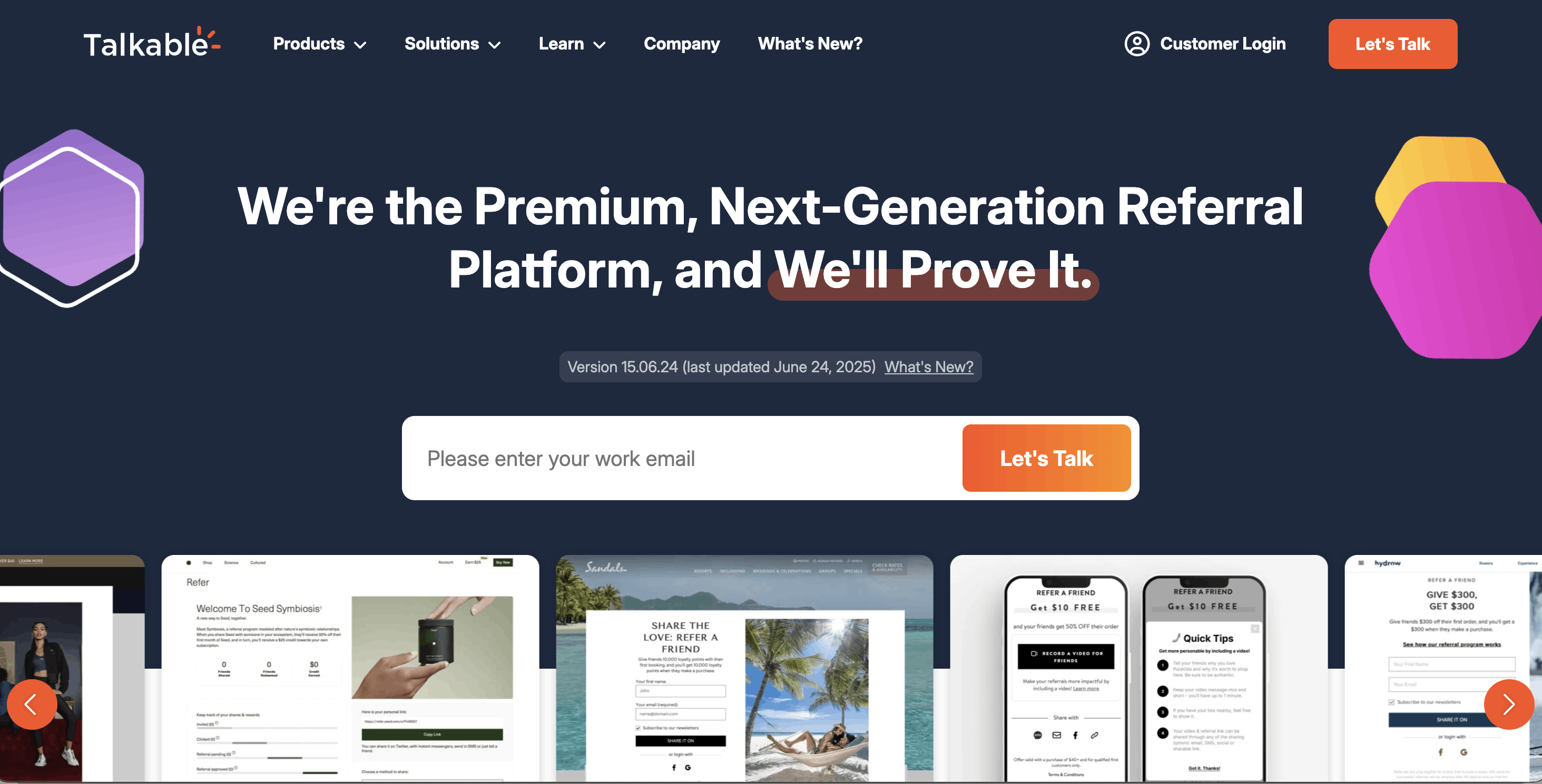
Talkable offers extensive A/B testing and tracking capabilities so marketing teams can understand program performance and ROI in real time. Its detailed dashboard allows brands to tailor and optimize every step of their referral journey.
The platform includes comprehensive segmentation capabilities so marketers can target customer audiences based on behavioral and purchase insights. It also supports personalized offers and rewards to help campaigns resonate with consumers.
One of Talkable’s unique offerings is its video referral feature, which allows customers to create authentic video content that brands can leverage across marketing channels.
Over the past decade, Talkable’s fraud management algorithm has saved $100M+ in fraudulent referrals, helping customers protect their marketing budgets and program integrity.
Pros
Excellent fraud prevention and security features generate high-quality referrals
Outstanding customer support services include dedicated account managers to help optimize campaigns
Comprehensive A/B testing suite and advanced segmentation capabilities
Simple integration process using APIs and webhooks
Video referral capabilities support authentic customer-generated content
Cons
Enterprise pricing may not work for smaller company budgets
Requires a 12-month contract commitment
Includes implementation fees
Talkable integrations
Klaviyo
Adobe Commerce (Magento)
Salesforce Commerce Cloud
BigCommerce
Mailchimp
HubSpot
Attentive
Yotpo
Tremendous, and more
See the full list of Talkable integrations.
Use Talkable if: You're an enterprise e-commerce brand looking for a sophisticated referral marketing platform with strong fraud protection, dedicated account support, and advanced testing capabilities.
Referral Factory
Referral Factory is a plug-and-play referral marketing platform that lets businesses build out their programs without technical know-how. You get access to over 100+ templates and can create both customer referral and affiliate programs in over 20 languages. The platform connects with many popular CRMs and marketing tools so you can easily integrate it into your existing tech stack.
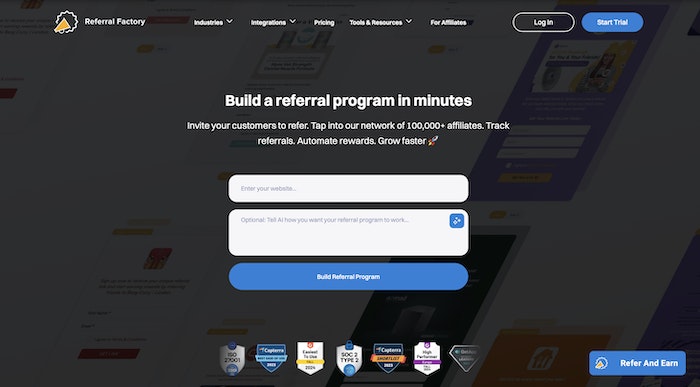
(Image source: Referral Factory)
Pros
Drag-and-drop builder for easy setup
Flexible reward options
Automated tracking and analytics
Dedicated customer support
Access to 100,000+ affiliates
Cons:
Not as customizable as some other tools
Referral Factory integrations
With Referral Factory, you can connect your program to over 3,000 apps, including:
Hubspot
Salesforce
Zapier
Pipedrive
ServiceTitan
Stripe
Tremendous, and more
See the full list of Referral Factory integrations.
Use Referral Factory if: You want to get a referral program up and running quickly without IT support. Referral Factory is a good choice if you'd rather use premade templates with automated analytics instead of building a custom program from scratch.
Superfiliate
Superfiliate helps brands build referral and affiliate marketing programs through personalized landing pages, rewards portals, and widgets.
The platform can turn every shared referral link into a co-branded experience.
This means when a customer shares a link to a referral page, Superfiliate generates a personalized landing page. It’ll show both your brand and the sharer’s name, photo, or message.
This personal touch makes the referral feel more trustworthy and relevant to the person receiving it. And this, in turn, increases credibility, driving higher conversion rates.
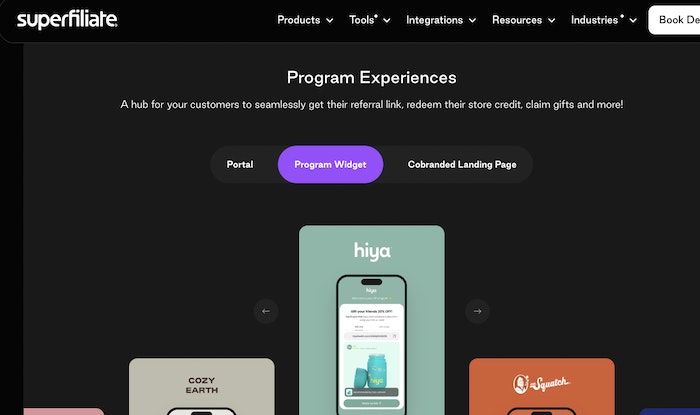
Superfiliate’s refer-a-friend platform handles everything: campaign management, performance tracking, and rewards payouts
Brands like Dr. Squatch have seen strong results with Superfiliate, including reducing customer acquisition costs (CAC) by 89% compared to other paid channels.
Pros
Personalized landing pages for each affiliate or customer
Supports multiple program types: influencer, affiliate, referral, and loyalty
Automated reward distribution, including cash, store credit, or gifts
Advanced analytics and reporting to track program performance
Cons
Strong focus on influencer referrals, which can be a drawback if your brand doesn’t work with influencers
Mostly Shopify focused — limited integrations with other platforms
No published pricing page
Superfiliate integrations
Shopify
Recharge
Stay AI
Klaviyo
Attentive
Postscript
Use Superfiliate if: You’re a Shopify brand that wants a simple way to manage affiliate, influencer, and referral programs in one place. This platform works especially well if you like the idea of personalized, co-branded landing pages that make shared links feel more trustworthy.
Extole
Extole is an enterprise-level referral marketing platform that helps companies turn customers into advocates. Its advanced reporting goes beyond simple link tracking to give you deeper insight into performance metrics like customer behavior.
This platform works with several big-name brands that use large, complex referral programs, including Cinemark, Bose, Lovesac, and Princess Cruises.
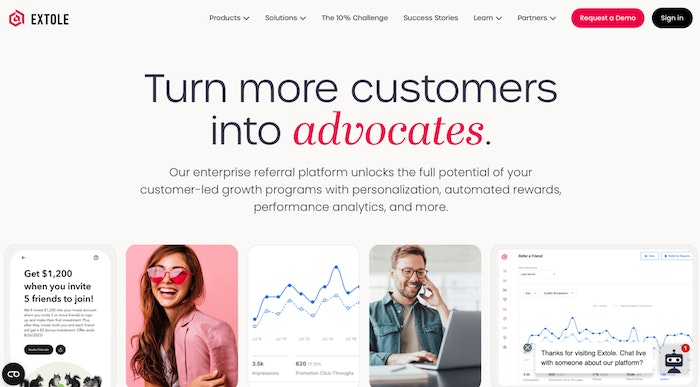
(Image source: Extole)
Pros
Sophisticated reporting and analytics for higher-quality insights
Customizable solutions for highly regulated industries
Tools to build personalized customer journey flows
Robust API
Enterprise-level security and compliance
Cons
Not ideal for smaller orgs
Requires IT support for setup
Extole integrations
Extole partners with a variety of technology providers such as:
Hubspot
Klaviyo
Okta
Amplitude
Shopify
Zapier
Tremendous, and more
See the full list of Extole technology partners.
Use Extole if: You need an advanced referral program with sophisticated testing capabilities, detailed customer segmentation, and a high level of security. This platform works well for enterprise organizations with technical resources and budget to invest in premium software.
LoudCrowd
LoudCrowd creates custom landing pages for customers who share your brand. These landing pages are kind of like mini online stores that present the customers' favorite products. With these pages, customers naturally act like influencers and informal brand ambassadors.
This referral program software also connects directly to Instagram and TikTok. When customers post about your products, LoudCrowd pulls that content into its system and tracks how well the content performs.
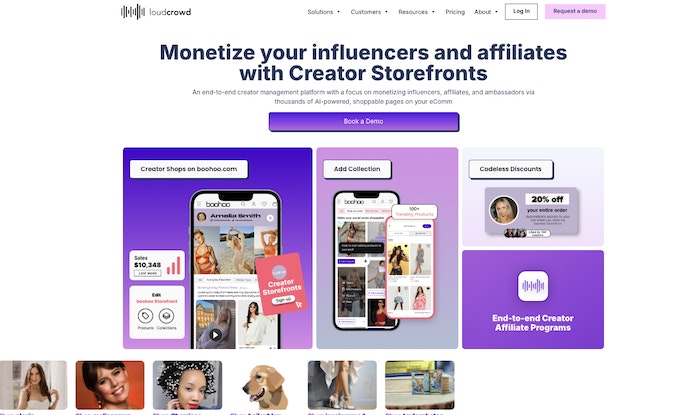
LoudCrowd includes tools to run referral contests or challenges (such as “refer three friends, win a gift”) and handles sending out rewards.
Brands like Wayfair and Sony use this platform to spot their most enthusiastic customers on social media, get permission to reuse their content, and track the impact of these campaigns.
Pros
Automatically creates personalized storefronts where creators can share your products
Integrates with social platforms like Instagram and TikTok to track user-generated content (UGC)
Offers automated reward distribution including gifts, discounts, and charitable donations
Provides tools for running contests and campaigns that can get more users to participate in your referral program
Cons
Pricing only available upon request
Can take time to fully understand how to use all the features
LoudCrowd integrations
Klaviyo
Tremendous
Yotpo
Shopify
Magento
WooCommerce
BigCommerce
TikTok
Instagram, and more
See LoudCrowd’s full list of integrations.
Use LoudCrowd if: You're an e-commerce or DTC brand with a strong social media presence and you want to offer personalized shopping experiences. LoudCrowd is especially helpful if you want to take advantage of user-generated content in your rewards program.
Yotpo
Yotpo offers an integrated suite of e-commerce marketing tools including reviews, loyalty, and referral programs. Yotpo lets brands set up loyalty programs that feel personal, using visual editors to customize how rewards look and work. Built-in analytics help track how well the program is performing and how customers engage with it.
The Yotpo team also offers a lot of support. Each brand gets help from a dedicated account manager to design and launch their customer referral program.
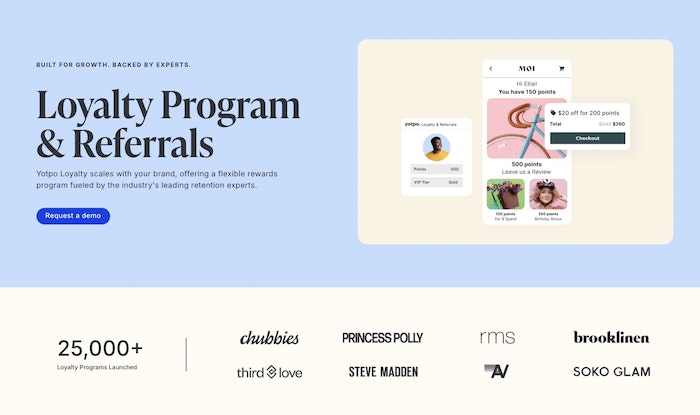
Yotpo also connects easily with tools you’re probably already using, like email platforms, social media, and customer support software. This platform supports everything from points-based rewards and VIP tiers to birthday gifts and referrals.
Pros
Offers flexible reward structures including points, VIP tiers, and referrals
Built-in visual editors for customizing the customer experience
Strong analytics and reporting tools to track engagement and ROI
Dedicated account management and program support
Reasonable pricing based on monthly order volume — Yotpo even offers a free plan with basic points and campaign referral capabilities
Cons
Users report slowed site speed when using certain Yotpo features
Pricing for advanced features can add up quickly
Yotpo integrations
Shopify
BigCommerce
WooCommerce
Salesforce
MailChimp
Hubspot
See Yotpo’s full list of integrations.
Use Yotpo if: You’re a mid-sized or enterprise e-commerce brand that wants a fully customizable loyalty and referral program. Plus, you want strong analytics and seamless integration into your broader marketing stack.
Ambassador
Ambassador makes it easy for customers to refer others, which helps brands grow their word-of-mouth marketing. This platform includes tools like QR codes and refer-a-friend widgets that people can share on social media.
Companies of all sizes — from growing startups to big names like H&R Block — use Ambassador to turn happy customers into active advocates for your brand.
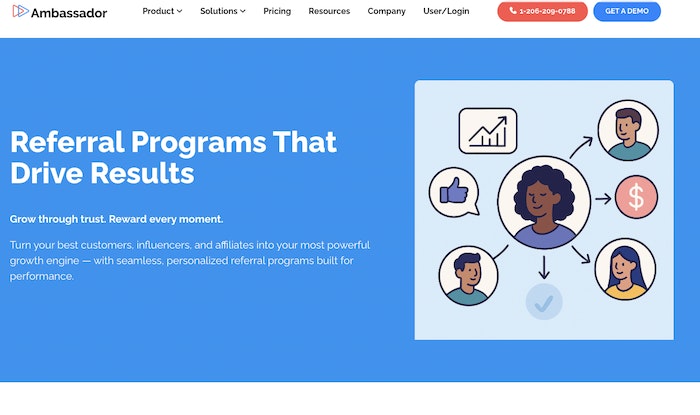
This referral program software tracks which people drive the most referrals and engagement, so you can identify your top promoters. Ambassador also sends out rewards automatically, plus it includes fraud protection and tracking to keep your referral program running smoothly.
Pros
Supports multiple referral types (customer, employee, affiliate, influencer)
Built-in tools like refer-a-friend widgets and QR codes make sharing easy
Automated reward distribution and fraud prevention
Real-time analytics to track referrals, conversions, and advocate performance
Scales well for both startups and enterprise brands
Cons
Interface feels a little dated compared to newer platforms
Setup can be complex and time-consuming
Pricey — plans start at $300 a month and go up from there
Ambassador integrations
Shopify
HubSpot
Salesforce
Mailchimp
Klaviyo
Stripe
Magento
Zapier
Segment, and more
See the full list of Ambassador integrations.
Use Ambassador if: You’re a growing, or even established, brand looking for a flexible, all-in-one referral solution that supports multiple use cases including customer, influencer, and employee advocacy. Ambassador also offers built-in automation, tracking, and fraud protection.
LoyaltyLion
LoyaltyLion helps brands create loyalty and rewards programs right inside their Shopify stores. The referral program software can sign customers up at checkout if they opt in. Then it tracks points they earn for things like buying products, leaving reviews, making referrals, or engaging on social media.
The platform can send referral requests at smart moments, too, like right after someone buys something or leaves a positive review. It also connects with tools like Klaviyo so you can include loyalty messages in emails and other parts of the customer journey.
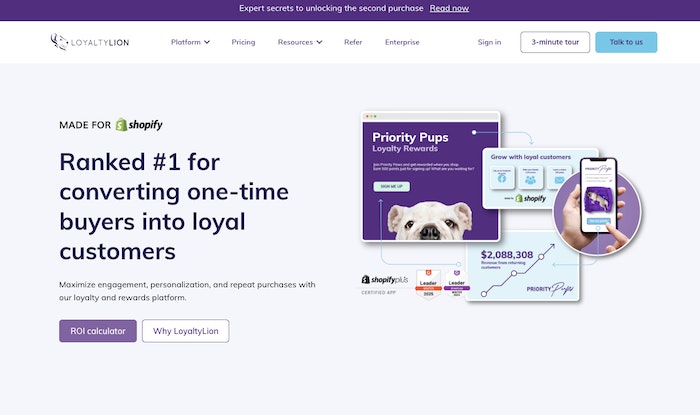
You can set up VIP tiers and custom rewards to keep your best customers coming back with perks like early access to new products. Dashboards that track revenue and CLV help show you how well your referral marketing program is performing.
Pros
Excellent integration with Shopify and Shopify Plus.
Automatic point tracking for customer purchases, reviews, and referrals.
Custom reward and VIP levels.
Easy to use, especially once it’s set up.
Smooth integrations, according to users.
Automated referral prompts after key actions like purchases or reviews.
Detailed analytics to measure ROI and customer lifetime value.
Cons
Some advanced features (like VIP tiers and custom branding) are only available on higher-tier plans—and pricing isn’t available for those, although we do know the basic plan starts at $199 a month.
Users report limited customization abilities.
Not as beginner-friendly for smaller brands or those new to running loyalty programs.
LoyaltyLion integrations
Shopify
Shopify Plus
Klaviyo
Gorgias
Recharge
Mailchimp
Yotpo
Okendo
Attentive
Smile.io
See the full list of LoyaltyLion’s integrations.
Use LoyaltyLion if: You run a Shopify-based store and want to build a loyalty program that rewards more than just purchases.
Note that this referral marketing tool is only for Shopify users. Other e-commerce platforms like BigCommerce and WooCommerce are not supported.
Referral Rock
Referral Rock helps businesses set up and run referral programs without needing a lot of tech know-how. The strength of this referral marketing tool is its customer service. When you sign up to be a customer, you get one-on-one attention from a dedicated advisor on the Referral Rock team.
Your advisor can help you do just about everything imaginable when it comes to program setup and design. This includes making recommendations based on your target audience and creating program copy.
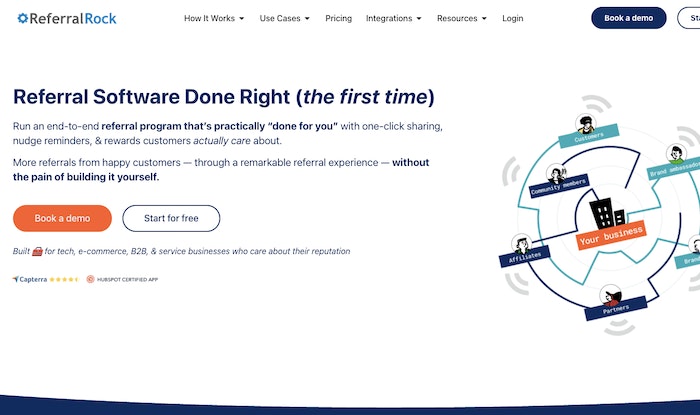
The support continues throughout the life of your program. Anytime you need help, Referral Rock's team is ready to jump in with guidance, advice, and suggestions.
As the Referral Rock team says, "We can't say it's 100% done for you, but we get as close as possible while keeping you at the helm." If you need a turnkey referral marketing software solution, Referral Rock is a top pick.
Pros
Easy to launch with minimal technical setup—and with help from your dedicated program advisor (every annual plan includes this!).
Supports both customer referral and affiliate marketing programs.
Customizable reward structures and sharing options.
One-click sharing via email, social media, or unique links.
Affordability—Referral Rock starts at $175 a month, which is lower than many of the other referral marketing tools on this list.
Cons
Interface and design options can feel basic compared to newer platforms.
More robust features (like advanced integrations) are only available on higher-tier plans.
Not as specialized for ecommerce as other tools—the focus is more broadly on tech, B2B, service, and ecommerce. This can also be a plus, depending on how you look at it.
Referral Rock integrations
HubSpot
Salesforce
Mailchimp
ActiveCampaign
Zapier
Shopify (via Zapier or API)
Custom webhooks
See all of Referral Rock’s integrations.
Use Referral Rock if: You want to set up a referral or affiliate program quickly without heavy dev work, and you value having one-on-one support to guide your strategy. This platform fits well with both e-commerce and service-based businesses looking to grow through word of mouth.
Vyper
Vyper helps businesses grow by running gamified marketing campaigns that reward people for sharing your brand. These contests, giveaways, and loyalty programs can be added to your site as pop-ups, landing pages, or embedded forms.
This referral marketing software offers a free plan that lets you set everything up before paying for your first campaign. Bigger businesses can upgrade to the Enterprise plan at $149 per month, which allows up to 30,000 leads per month and includes more advanced features.
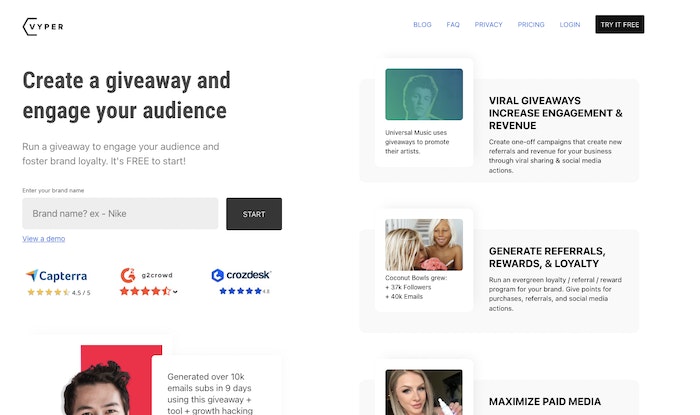
Vyper is a more basic referral program software compared to high-tech counterparts like Yotpo, LoyaltyLion, or Friendbuy. It’s built more for quick contests and giveaways than for creating long-term loyalty program infrastructure for your brand.
While it doesn’t offer sophisticated customization or complex integrations, Vyper referral marketing software is easy to set up and use. Especially if you have a short-term goal like growing an email list or getting more engagement on social media.
Pros
Quick way to launch contests, giveaways, and referral campaigns
Gamified features (like leaderboards and points) that make engagement fun and easy
Simple drag-and-drop builder for landing pages and widgets
Affordable pricing, including a free tier for pre-campaign setup
Good for email list growth and social media traction
Cons
More limited in what it can do vs. full-service referral marketing software
Lacks valuable loyalty features like VIP tiers or long-term point systems
Fewer integrations and automations compared to enterprise tools
Not ideal for brands that need highly customized or complex programs
Vyper integrations
Zapier
Mailchimp
ConvertKit
Klaviyo
Note that Vyper does not directly integrate with e-commerce software. See the full list of integrations on the Vyper pricing page.
Use Vyper if: You’re a small to mid-size brand looking to launch engaging referral or contest campaigns without heavy setup. This referral marketing software is a good fit if your goal is to grow your email list, increase social shares, or run quick promotions that get people to start talking about your brand.
How to choose the right referral program software
When picking a referral system, focus on more than just pricing — although that’s important, too.
Look for functionality that fits your goals, like customizable rewards, automated gift card delivery, and built-in fraud prevention.
The best tools track real-time metrics, so you can see what’s working and optimize as you go. Bonus points if the platform integrates with your existing marketing platform to keep everything connected.
A strong referral program should be easy to manage, scale with your needs, and give you clear data on performance.
| Platform | Best for | Price range | Standout feature |
|---|---|---|---|
| Friendbuy | Enterprise e-commerce brands | $$$ | Fine-tuned customization, A/B testing |
| Lootly | SMB e-commerce (B2B, B2C, D2C) | $$ | Combined loyalty, referrals, and gamification |
| Talkable | Enterprise e-commerce brands | $$$ | Video referrals, fraud prevention |
| Referral Factory | Small to midsize orgs with low technical support | $$ | Fast template-based web setup with no coding required |
| Superfiliate | Shopify brands with influencer focus | $$$ | Personalized landing pages for sharers |
| Extole | Enterprise brands | $$$ | Excellent customer support for enterprise organizations |
| LoudCrowd | Brands with strong social media presence | $$$ | Focus on UGC and social campaign tracking |
| Yotpo | Mid-sized to enterprise Shopify brands | $–$$$ | All-in-one loyalty, referral, and reviews program functionality |
| Ambassador | Multi-channel referral programs (employee, influencer, etc.) | $$$ | Support for many types of referrals, comes with fraud protection |
| LoyaltyLion | Shopify brands building loyalty + referral programs | $$–$$$ | Smart referral triggers and a strong Shopify-only focus |
| Referral Rock | Quick setup with lots of support | $$ | Dedicated advisor and guided, almost done-for-you setup |
| Vyper | Small brands running contests and giveaways | $ | Gamified contests focused on social growth |
Benefits of using a referral marketing tool
Modern referral software eliminates manual tracking while providing sophisticated analytics and automation. The right platform can strengthen your referral program with:
Automated tracking and validation that attributes referrals to specific customers and validates legitimate leads. This prevents referral fraud while ensuring accurate reward distribution.
Streamlined reward distribution based on your program rules. This reduces administrative work for your team and ensures timely incentive payouts to customers.
Enhanced analytics and reporting on program performance, referral sources, and conversion rates. These metrics help you optimize campaigns and demonstrate ROI to your stakeholders.
Fraud prevention features that detect suspicious activity and flag incentives fraud early, protecting your program’s integrity and your marketing budget.
Deep integrations that connect referral program data with your CRM, email, and e-commerce platforms. This creates a cohesive customer experience and simplifies program management.
A/B testing capabilities that allow you to try out different incentives, messaging, and program rules to optimize performance. Data-driven optimization helps maximize conversion rates and program ROI.
Scalable infrastructure that can handle high volumes of referrals without hiccups. This allows your program to grow without technical limitations.
Drawbacks of using a referral marketing tool
While referral software streamlines program management, there are some drawbacks to keep in mind.
Implementation complexity: Some platforms require significant technical setup and customization. This may extend your timeline for program launch and require IT resources.
Onboarding learning curve: New software means training for marketing and customer service teams. Your team will need time to learn a new platform’s features, workflows, and best practices.
Cost considerations: Many platforms require annual contracts with minimum commitments. Before you onboard a new tool, make sure that your referral volume justifies the investment.
Key takeaways
Modern referral platforms do more than just track referrals and distribute rewards. They offer sophisticated features like fraud prevention, A/B testing, and deep integrations with your existing marketing stack. Which solution is right for your business depends on your specific needs and requirements.
The most impactful referral programs blend technology with thoughtful strategy. When evaluating platforms, focus on solutions that align with your business goals and can scale as you grow.


